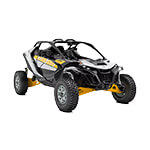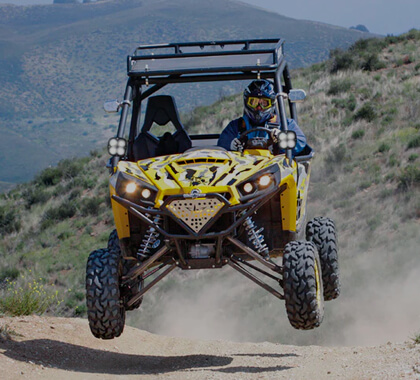What to Look Out for When Buying Can-Am Maverick R Wheel Spacers & Adapters?
Bolt-On vs. Slip-On Maverick R Spacers
Choosing between bolt-on and slip-on spacers depends on your Maverick R's usage and preferences, so do keep that in mind once you go shopping.
Bolt-On Spacers
These attach directly to the vehicle's hub and often require longer wheel studs. On the bright side, they offer increased durability and stability, making them ideal for aggressive off-road use or Maverick R owners with larger tires.
Slip-On Spacers
Slip-on spacers are easier to install and are less permanent because they slip on existing wheel studs and are secured with extended lug nuts. They're great for enthusiasts seeking a less drastic modification and those who frequently change their vehicle's setup.
Spacer Sizes
Small Spacers (1 to 1.5 inches)
These subtly increase the track width of your Can-Am Maverick R by enhancing stability and handling without significantly altering the Maverick R's dynamics or causing clearance issues.
Larger Spacers (2 to 3 inches)
These create a more noticeable change in stance and can improve off-road capabilities but may add stress to suspension components and cause clearance challenges at higher speeds.
Build Materials and Durability
Aluminum: Aluminum offers a good balance between strength, weight, and corrosion resistance which is why these are the most popular for both spacers and adapters. Steel: Steel is known for its extreme durability and is ideal for heavy-duty use, but is also heavier and more prone to rust.
Billet Aluminum/Composite: Premium choices for high performance and longevity, albeit at a much higher cost.
Wheel Adapters for Maverick R
Adapters allow for the use of wheels with different bolt patterns, even though this is not usually recommended compared to simply buying properly sized wheels. It’s crucial to choose Can-Am Maverick R adapters that are compatible with both the Maverick R’s hub and the desired wheel's bolt pattern. Consider the thickness of the adapter as it affects vehicle clearance and suspension geometry, especially for heavily modified Maverick Rs or specific off-roading needs.
Hub-Centric vs. Lug-Centric Options
Hub-Centric: Hub-centric designs align with the vehicle’s center hub for a more secure fit, recommended for better load distribution and overall heavy-duty use. Lug-Centric: Aligns with the lug nuts but may not provide as precise a fit as hub-centric options.
Load Rating
Whatever you go for, make sure the spacers and adapters have a suitable load rating, particularly for off-roading, towing, or heavy-duty use. The idea here is to make sure all of your wheel and tire accessories are as durable as the wheels and tires themselves. Otherwise, it can all fail in a matter of seconds and your Can-Am Maverick R won’t be nearly as reliable.
Legal and Safety Implications
To complete the guide, you should also be mindful of legal regulations regarding modifications, especially if your Can-Am Maverick R is or will be street-legal. Wheel modifications like spacers can sometimes breach legal limits on wheel protrusion, leading to safety concerns and legal issues. Always verify that your modifications align with regional laws to avoid any complications that might come with that.








